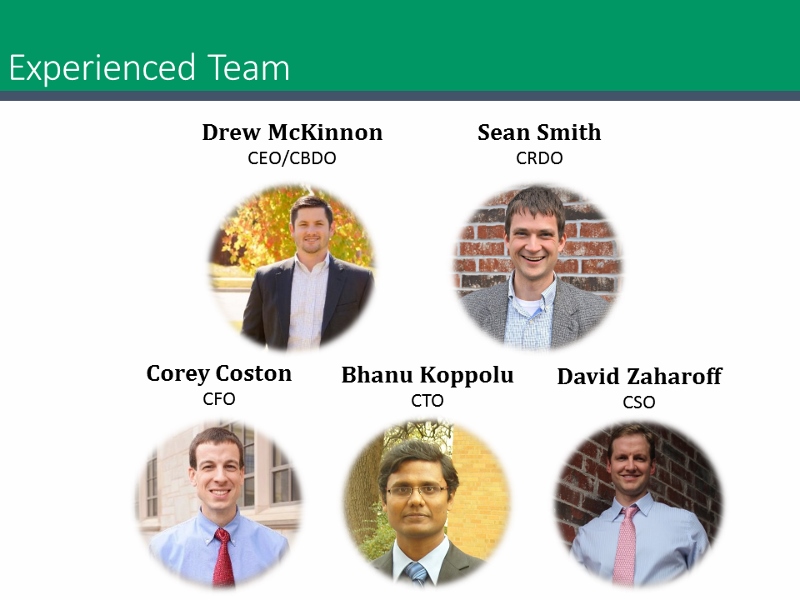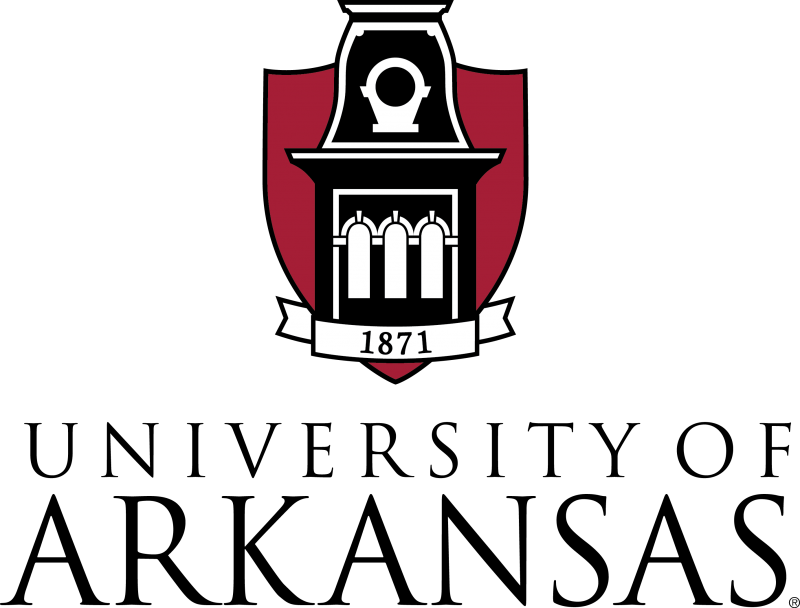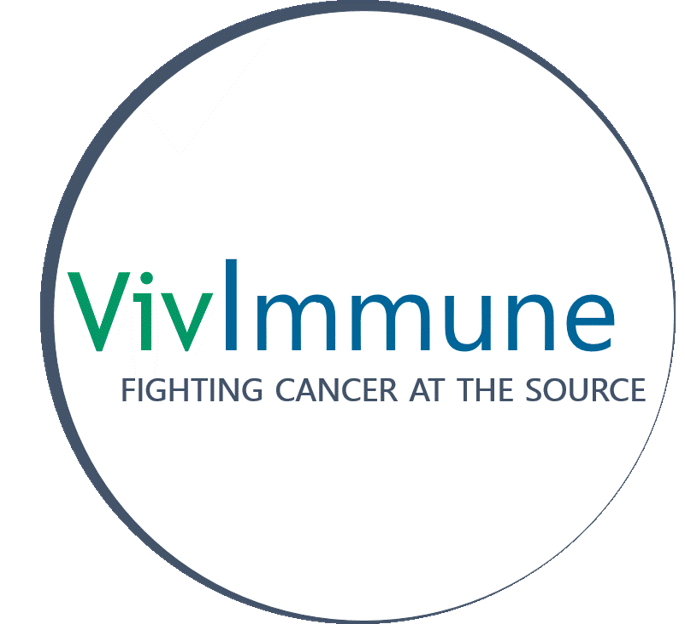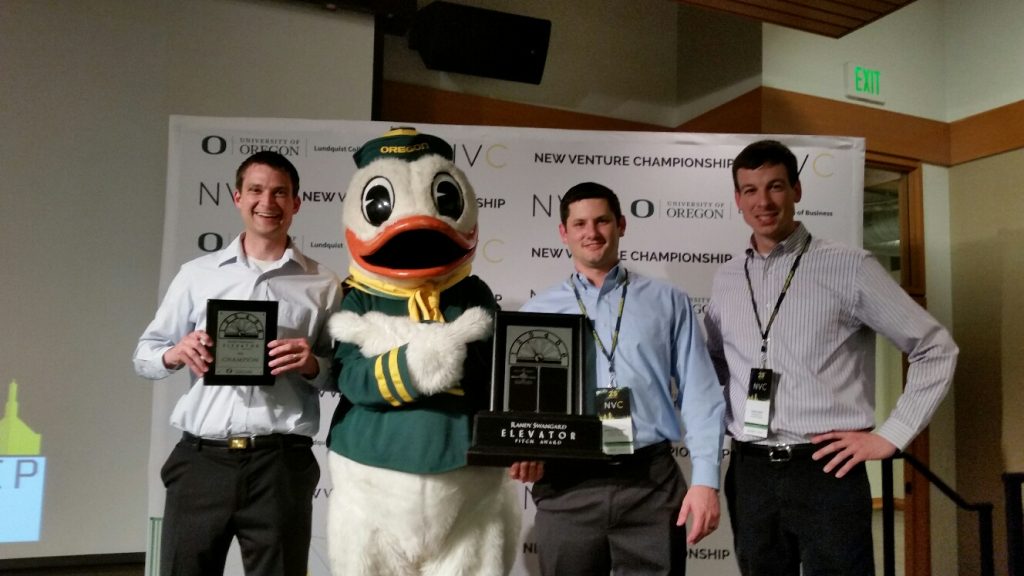by Elizabeth DeMeo
These past few months have been a whirlwind for Corey Coston, Andrew McKinnon, and Sean Smith. The three University of Arkansas graduate students (Coston and McKinnon are both executive M.B.A. students in Walton College of Business, and Smith is a doctoral student of biomedical engineering in the College of Engineering) are also members of VivImmune, a biotech startup focused on creating immunotherapies for bladder cancer. Since January, the VivImmune team has been competing in (and winning) entrepreneurship contests across the country, and is now preparing for one more: the Donald W. Reynolds Tri-State Competition for teams from Arkansas, Oklahoma, and Nevada, from which the top team will take home an award of $30,000.
The team’s path to success began in the laboratory, when Smith, in conjunction with Assistant Professor David Zaharoff and Research Associate Bhanu Koppolu (both also of the Department of Biomedical Engineering) created a way to, as Smith explained, “make cancer immunotherapies that can teach your body to find and kill cancer, and…also [to] teach it to remember what the cancer looks like.” Though they’re interested in creating immunotherapies that could be injected into any solid tumor, Smith noted that they started by targeting bladder cancer (the immunotherapies for which are injected through a catheter) for several reasons, chief among them the lack of new therapies in the bladder cancer field, and the high failure rate of current treatment, not to mention the high rate of recurrence following that treatment.

It wasn’t until this past fall, however, that these immunotherapies found their way into the business world. Before the fall semester began, now-CEO McKinnon suggested to friends Coston and Smith that they all take the New Venture Development course offered by the Walton College of Business. The graduate-level course is taught by Carol Reeves, the associate vice provost for entrepreneurship at the University of Arkansas, or, as she’s often called, “The Coach.” This is a nickname Reeves has more than earned due to her success in leading entrepreneurship teams to victory; over the course of the past decade, she’s helped graduate student teams from the University of Arkansas win over $2.2 million in cash in regional, national and international business plan competitions.
Through Reeves’ course, explained Smith, he and his teammates were able to take the existing research he’d done with his colleagues and transform it into a sellable product. Smith, Coston, and McKinnon worked hard during the fall semester to create a business they were confident in; they researched other companies in their field, and performed interviews with potential customers as a way to better understand exactly what their needs were. They also selected a name for their company—“we googled a lot of biotechs” Smith explained, before narrowing the field of potential monikers down to four. The team then polled friends as to which name sounded “most biotech-y,” and a winner emerged: VivImmune. By December of 2015, the VivImmune team had several drafts of a business plan completed, and were selected as the top team in their class with Reeves following an end-of-semester presentation.
The next step was to take their business plan from the proverbial frying pan of the classroom into the fire of their first entrepreneurship contest. Their victory in the in-class contest enabled the VivImmune team to enter the Brown-Forman Cardinal Challenge, a national business plan competition in Louisville, Kentucky. The team won first place in the competition and a cash prize of $15,000, as well as in-kind prizes of $100,000 should they elect to relocate to Louisville.
That first victory was followed by a string of success, which included taking first place overall in the Donald W. Reynolds Governor’s Cup Collegiate Business Plan Competition in Little Rock (which came with a cash prize of $25,000), and receiving an innovation award of $5,000 and elevator pitch award of $2,000 at that same competition. The team also placed third overall and won the elevator pitch competition at the New Venture Championship in Portland, Oregon (which garnered them $2,500 and $4,000, respectively), and received $700 at the most recent competition they attended at Rice University.
Preparing for each competition, Smith explained, can be an arduous process, particularly because the requirements of each contest differ. Though nearly all contests require that teams submit a business proposal prior to being accepted, the specific requirements for the proposal change from contest to contest. As such, the team is constantly having to alter, edit, and cut or expand their proposal as each successive contest arises. What’s more, each contest comes with differing presentation requirements, as well as differing sets of judges, whose familiarity with the science behind VivImmune can vary widely. In a single round of a contest, Smith explained, you could have a judge with a doctoral degree in biology as well as a judge with a master’s degree in business; you’d have to figure out how to present your product in a way that was palatable to both judges, and answer any questions they might have, and do all of this in less than thirty minutes. Additionally, Smith added, advice offered by judges can often be conflicting, which can make it difficult to know which feedback to incorporate into the VivImmune business plan.
Despite these difficulties, the team continues to compete. As previously mentioned. VivImmune’s next immediate move is to head to Donald W. Reynolds Tri-State Competition competition. In the longer term, they’re working on finding new sources of funding, including private investors and startup grants.
When asked what he’d like to say to fellow entrepreneurs, Smith had several pieces of advice. First of all, he suggested that his peers at the graduate level enroll in Reeves’ New Venture Development course if at all possible. He encouraged potential enrollees to consider, in advance of the course, the type of product they’d like to create, and to take a realistic look at the process of how that product becomes a business. For instance, he explained, entrepreneurs looking to make a biotech product like VivImmune’s should be cognizant of the fact that they’ll have to rely exclusively on fundraising till they start to sell the product.
Of equal importance to picking the right product, Smith noted, is building the right team. He noted that one of VivImmune’s greatest strengths has always been “the rapport and total trust” the team members have for one another, and advised those who enroll in Reeves’ course to try to do so with colleagues they know they’ll work well with. “Surround yourself with people you like,” Smith advised, “because you’re going to be with them a lot.”


